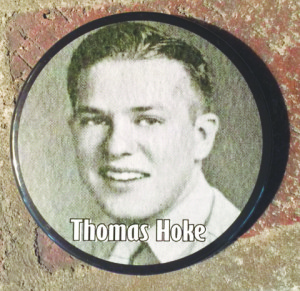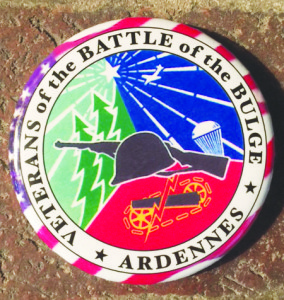Deb Spalding
 “Some days I wonder if it’s a blessing or a curse to live to be as old as I am,” said
“Some days I wonder if it’s a blessing or a curse to live to be as old as I am,” said Emmitsburg native and ninety-two-year-old World War II Veteran, Tom Hoke. “I’ve lived plenty of good times and plenty of bad times. I hope, when it’s my time to go, that I go without being a burden on anyone.”
Emmitsburg native and ninety-two-year-old World War II Veteran, Tom Hoke. “I’ve lived plenty of good times and plenty of bad times. I hope, when it’s my time to go, that I go without being a burden on anyone.”
During his lifetime, so far, he’s seen everything from the horse and buggy to the man on the moon. He’s witnessed when radio, television, and the automobile, were new.
He attended local schools where those who could get to school went. There was no such thing as a snow day.
In his youth, he and his friends made their own entertainment with hide and seek or scavenger hunts. Tom said, “It was an enjoyable time.”
Emmitsburg’s telephone was a party line. Tom said, “You had your own ring, but probably everyone in town would listen in to get all the news.” Nellie Felix ran the telephone exchange.
Tom reminisced, “We would sled on the streets in town. The best hill was on Bollinger’s Hill behind the Lutheran Church.”
Amos and Andy were on the radio, Saturday nights you could get the Grand Ole Oprey. “Later on you could get the Lone Ranger and Buck Roger’s stuff with ray guns — today it’s come true with taser guns.”
Tom lived across from where the laundromat is now, two blocks up from the fire hall. He has three sisters and one brother who are all deceased. His parents are Joseph and Effie Hoke.
When Tom was young, Emmitsburg was a farming community. The town had everything anyone would need. He said, “Everybody was poor but nobody knew it.” Emmitsburg was a very self-sufficient town.
Their swimming pool was Tom’s Creek. If it was running, it was clear, if not, it was stagnant. They stayed out of the stagnant parts. At Christmas, “Santy Clause” gave the kids an orange and a box of candy. Then they’d go to the Gem Theater to see a free movie, then to the fire hall for a tin cup full of vegetable soup.
They were always busy, but somebody always knew where they were and where they were going. They had no drug or whiskey problems, but cigarettes were common. Tokar’s sold cigarettes a penny a piece. By high school, most kids were sneaking a smoke. Tom tried cigarettes, cigars, a pipe, and then dipped snuff. He has since quit all of that.
The train brought the school kids in from Rocky Ridge and Motter Station. St. Euphemia’s School taught eight grades. The girls went on to St. Joe’s, the boys went to public school. In doing so, the boys had to repeat 8th grade. Pappy Kugler was the only janitor at the school (Emmitsburg High School). He kept the school clean and warm with the coal fired furnace burning.
At school, some would crawl through the trap door in the ceiling of the girl’s locker room and go up and sit on the roof and skip classes. The boys would skip school and head over to the train station when the Baseball World Series was on to keep up with the scores. Kids had a tradition of hiking up to Indian Lookout every year. You were one of the crowd if you got to go along.
Tom graduated from school and then worked for the Troxell Brothers selling feed and fertilizer, then for Charlie Harner at the general store. Tom said he was Harner’s “Head Rabbi” killing chickens, turkeys, ducks and geese, then taking them to Baltimore City to sell.
At age nineteen, Tom and his friends, Mickey Eyler and Bill Chase, were walking down the street. Guy Nunamaker was going the opposite direction and asked why they weren’t in the Army. Tom said, “The next week, we had our draft notices.”
Tom was given one week to get things in order, then to report to Fort George G. Meade in Maryland. He was off to serve as a Staff Sergeant as a medic in the Army. From Meade, he and some other enlisted men were sent to Camp McCain in Mississippi where they met up with other nineteen-year-olds from all forty-eight states to form the 87th infantry division. Tom said, “Camp McCain was the worst camp in the United States — ever! It was condemned from the day it was built and littered with snakes, mosquitoes, ditches, swamps, and plenty of chiggers.”
They would complete training over thirteen weeks. Tom was assigned to the medical battalion. He was a “litter bearer.” His job was to support and aid the wounded, and to get them off of the battle field and into the medic aid station by whatever means available.
Tom said his aid station resembled the medic camp featured on the television show MASH. As part of Company C 312th Medical Battalion, they had four doctors, ten ambulances, and fifty litter bearers.
Tom and his unit were sent to Fort Jackson in North Carolina, a wonderful camp compared to Camp McCain, where he continued training and learned more first aid.
They were then sent to Camp Kilmer, their point of impartation to provide support during the Battle of the Bulge in World War II. On November 27, 1944, they boarded the Louie Pasteur, a French luxury ship manned by an English crew. They had to stay below deck and many of them got sea sick. Nine days later, they arrived in Liverpool, England, where they awaited transportation across the English Channel. To cross the English Channel, they were given Sea sick pills but they didn’t need them since crossing the English Channel was nothing compared to crossing the Atlantic Ocean.
Being a pack rat, Tom gathered up motion sickness pills which later proved wonderful for hangovers for the other men.
Their first assignment was to support the 347th Infantry as they were to take a hill in Aken. Quite a few infantry were wounded, but war courtesy meant that you didn’t aim for the medics. It took them two days to take the hill with heavy mortar fire. They didn’t find Germans—they had withdrawn.
After Aken, they approached the Siegfried Line; Hitler didn’t think it could be breached. “But,” Tom said, “once you cracked a pill box, the Germans were pretty easy to take prisoner.”
One night, Tom and his buddies stayed in one of the German Pill Boxes. Their German interpreter, Embry Summy—a boy from the Amish Country, who spoke Pennsylvania Dutch—was practicing his German outside the pill box. Tom and his gang thought there were Germans outside. Tom said, “Well, we talked to him with soldier talk and let him know not to do that anymore!”
His unit was called into the Battle of the Bulge to where the 106th surrendered. During defensive action to hold the Germans from coming in—the weather got bad. It was twenty degrees below zero with two feet of snow and fog. Airplanes weren’t flying. The soldiers were spending all their time in fox holes. Tom noted, “They were taught how to dry socks, but a dry sock in a wet shoe doesn’t do much good. We were treating frozen foot and frost bite.”
General Patton said to a chaplain that he wanted him to pray for a clear day. It worked! The next day the clouds cleared and the sun came out. Morale went up, planes were flying.
They were there from the 16th of December to the 25th of January. It took that long to push the Germans back. After that, they went back down and cleaned the Siegfried Line, then had to cross the Mozell River.
Tom recalled, “Any river crossing usually cost a lot of men. We had A Company help, and crossed in soft boats. Company B lost three when a boat was sunk. After that we still had the Rhine River—we crossed that by crossing a bridge. Then we went to dismantle the bridge; two engineers were shot under machine gun fire.”
Next, Tom’s unit started their big push across Germany. General Patton was running his tanks as fast as he could, as long as he could. Tom said, “We caught up with him then leap frogged across Germany.”
We had to find a place for our aid station. Sometimes it was a places without a roof or a chicken pen. We split in half. Half of us would sprint ahead of Patton, then once he got there, the other half would sprint ahead.
On April 11, Tom was on an advanced party when they came across the Buchenwald prison camp. Tom remembered, “That is something you’ll never forget, especially the odor.” The guards had already left but the prisoners would not leave the camp thinking it was a trap. Tom’s group identified themselves and the prisoners came out looking for food. The soldiers couldn’t give them food because of their emaciated condition, but they shared some drinks.
Patton’s 6th Army got the credit for liberating the concentration camp. Tom’s general wanted to fix that, but couldn’t.
After that, Tom recalled, “We were to hold our position and not fire on until fired upon. We got word that the Russians were uniting with British and American troops. On May 7, we got notice that Germany had surrendered.”
Tom was sent home on furlow when President Truman ordered the first atomic bomb dropped. That got the Japanese’s attention. They dropped the second bomb. Tom was scheduled to go to Japan on the first wave to hit the main land and feels the President saved his life.
On January 9, 1946, Tom was handed his discharge papers and pay. He headed home to Emmitsburg.
At home, he was going to take the discharge papers to the court house to have them recorded. He looked closely at his discharge paper—it had one serial number on one side and another on the other. It listed medals he didn’t earn and some that he did earn were not listed. He said, “That’s the Army life. You got used to it.”
Tom got married in 1947 to Ethel Long. She was from Motter Station where her family farmed. He met her when she was working at Harner’s while Tom was on furlow and they started dating.
Tom retired from Potomac Edison as heavy equipment operator. He said, “Potomac Edison hates me. I’ve been drawing out their pension for over 30 years. I’m still looking for the golden years. Haven’t found them yet, but I’m still hunting.”
Tom said that the thing that he’s most proud of is that he has friends. That means the most. He added that the worst part about getting old is losing people. “I really miss my wife.”
These days, Tom travels often. He loves Alaska, likes the beach in South Carolina, claims the best steak is in Oklahoma City, and has eaten some pretty good Prime Rib in Montgomery, Alabama. He doesn’t have much fondness for Mississippi or plane rides. He said, “After Mississippi, anything looks good. I got pneumonia down there.”

